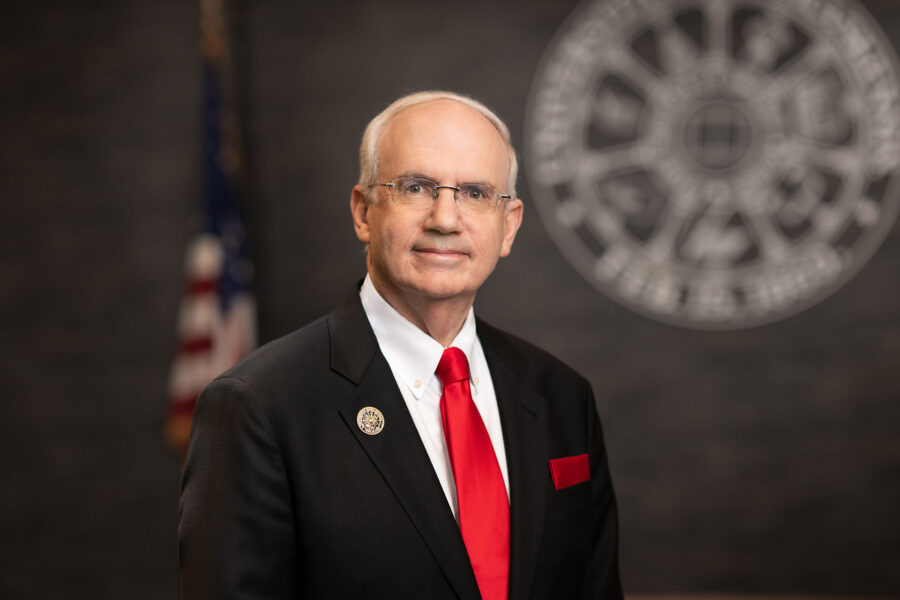The University of Nebraska isn’t just contributing to the state’s economy by developing future workforce — it’s an engine of growth across the state, according to a newly released economic impact report.
The report, shared during a news conference at Hudl, 600 P. St., Lincoln, on Tuesday, reveals that NU generates $6.4 billion annually and supports one in every 20 Nebraska jobs. Conducted by national consulting firm Tripp Umbach, the report highlights the university’s vital role in workforce development, research innovation, and community prosperity.
“The University of Nebraska is one of the most important investments we can make in the future of our state,” said NU President Jeffrey P. Gold, MD. “From the jobs we create to the future workforce we educate to the research we produce, our university is helping move Nebraska forward in meaningful ways. For every $1 the state invests in the University of Nebraska, we generate $10 in economic activity—an extraordinary return on investment.”
The study highlights key areas where NU fuels Nebraska’s economic engine:
- Workforce Development: NU produces 11,000 graduates annually, with one in seven working-age Nebraskans holding a degree from the university. NU alumni generate $3.5 billion in additional earnings each year.
- Job Creation: One in every 20 jobs in Nebraska is directly or indirectly supported by the University of Nebraska, a number that increases to one in 11 when including Nebraska Medicine.
- Innovation and Research: NU’s $304 million in federal research awards fuel discoveries that benefit Nebraska businesses and communities.
- Community Impact: NU students, faculty, and staff contribute over $38 million in charitable donations and $76 million in volunteer service annually.
“The numbers speak for themselves,” said Paul Umbach, EdD, founder of Tripp Umbach. “Since 2015, the University of Nebraska’s economic impact has grown by 64%, far outpacing the state’s overall economic growth of just 24%. What’s remarkable is that NU isn’t just keeping pace—it’s leading the way in job creation, workforce training, research and innovation.”
Dr. Umbach, who has worked with over a thousand institutions across the nation and around the world, noted that compared to other universities, the University of Nebraska stands out. While many institutions’ economic impact has plateaued, the University of Nebraska’s trajectory of impact continues to grow, said Dr. Umbach.
“Per capita, the University of Nebraska does more to impact its state than any other university in America,” Dr. Umbach said.
By campus, UNL has an annual economic impact of $3.1 billion; UNMC of $1.6 billion; UNO of $1 billion; and UNK of $446.5 million. These impacts are felt not just in the communities in which each campus is located, but all across the state, bolstered by Nebraska Extension’s annual economic impact of $132.3 million and the Nebraska College of Technical Agriculture’s impact of $25.5 million.
Beyond dollars and cents, the university’s graduates strengthen communities. “College graduates are more likely to be employed, volunteer, contribute philanthropically, and participate in civic life,” Dr. Gold said. “That social return is just as important as our economic impact.”
Hudl, which was founded by University of Nebraska–Lincoln undergraduate students and has since grown into a global company, embodies NU’s impact by employing top graduates and attracting elite talent to Nebraska.
Brian Kaiser, Hudl’s cofounder and chief technology officer, said the university has been instrumental in Hudl’s success since the very beginning.
Kaiser was a student in the Jeffrey S. Raikes School of Computer Science and Management, along with David Graff and John Wirtz, when they founded Hudl in 2006. It wasn’t just the classes they took or the excellent program they were part of that set their fledgling business up for success, Kaiser said. It was also the relationships, the support and the mentoring they received during their University of Nebraska experience. Today, many top NU graduates go onto careers at Hudl, he said, and strong partnerships with the university, as well as a robust internship program, provide hands-on opportunities for students from NU and around the globe.
One of those students was Sierra Futterman. An out-of-state student, Futterman followed her brother to the University of Nebraska—Lincoln, and over the course of her college career had internships at Penlink, a Lincoln-based security company, and the University of Nebraska’s National Strategic Research Institute. She also worked with Hudl as part of her capstone project in the Raikes School. That capstone project led to a job as a Hudl software engineer.
“It shaped my career,” she said.
Her brother, meanwhile, accepted a position with Ameritas, another Lincoln business. Eventually, her parents moved to Nebraska, too.
“Now the whole family is together because of the university,” she said.
Those are the kinds of impacts – quality of life, ability to live close to family, the unique culture and connectedness of Nebraska and Nebraskans – that a report can’t capture, Dr. Umbach said. Yet they’re important.
Kaiser agreed. Part of what he loves about Hudl is its location in Lincoln. And he has no plans to move.
“We’re proud to be here, and we’re excited to grow with the state, grow with the city, and grow with the University,” Kaiser said.
As Nebraska faces an evolving economic landscape, continued investment in the University of Nebraska remains crucial, Dr. Gold said.
“This report provides clear evidence that NU is a catalyst for growth,” he said. “The university’s impact reaches every county, every industry, and every Nebraskan.”
See more information on the university’s economic impact and view the full report. To see what various community, business and industry leaders are saying about the report, click here.
